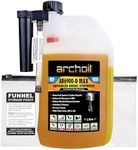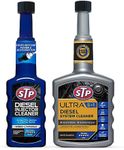Buying Guide for the Best Diesel Fuel Additives
Choosing the right diesel fuel additive can significantly improve the performance and longevity of your diesel engine. Diesel fuel additives are chemical compounds formulated to enhance the quality and efficiency of diesel fuel. They can help in cleaning the fuel system, improving fuel economy, reducing emissions, and preventing fuel gelling in cold weather. To select the best diesel fuel additive for your needs, it's important to understand the key specifications and how they align with your vehicle's requirements and your driving conditions.Cetane Number ImproverThe cetane number is a measure of the combustion quality of diesel fuel during compression ignition. A higher cetane number indicates that the fuel ignites more easily and burns more completely, leading to smoother engine operation and reduced emissions. Cetane number improvers can be particularly beneficial for older engines or those that experience rough idling. If you frequently drive in cold weather or have a high-performance diesel engine, look for additives that boost the cetane number.
Lubricity EnhancerLubricity enhancers are additives that reduce friction and wear in the fuel system, particularly in the fuel pump and injectors. This is crucial because modern ultra-low sulfur diesel (ULSD) fuels have lower natural lubricity, which can lead to increased wear and tear on engine components. If you want to extend the life of your engine and maintain optimal performance, choose an additive that includes lubricity enhancers.
Fuel StabilizerFuel stabilizers prevent the degradation of diesel fuel over time, which can lead to the formation of gums, varnishes, and other deposits that clog the fuel system. This is especially important if your vehicle sits unused for extended periods. If you store diesel fuel for long durations or have a backup generator, a fuel stabilizer can help maintain fuel quality and ensure reliable engine starts.
Anti-Gel AdditiveAnti-gel additives prevent diesel fuel from gelling or thickening in cold temperatures, which can clog fuel lines and filters, making it difficult to start the engine. These additives are essential for those who operate diesel vehicles in cold climates. If you live in or travel to areas with freezing temperatures, an anti-gel additive will help keep your fuel flowing smoothly.
DetergentsDetergents in diesel fuel additives help clean the fuel system by removing deposits from injectors, valves, and combustion chambers. This can improve fuel efficiency, reduce emissions, and restore lost power. If you notice a decrease in engine performance or fuel economy, or if you drive a high-mileage vehicle, look for additives with strong detergent properties.
Corrosion InhibitorsCorrosion inhibitors protect the metal components of the fuel system from rust and corrosion, which can be caused by water contamination in the fuel. This is important for maintaining the integrity and longevity of the fuel system. If you operate in humid environments or use biodiesel blends, which can attract more water, a corrosion inhibitor is a wise choice.
Emissions ReducersEmissions reducers are additives designed to lower the levels of harmful exhaust emissions, such as particulate matter and nitrogen oxides. These can help your vehicle meet environmental regulations and reduce its environmental impact. If you are concerned about air quality or need to comply with stringent emissions standards, consider an additive that focuses on reducing emissions.

















